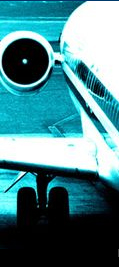|
Terrorized into
Absurdity
The Creation of the Transportation Security
Administration
By: Roger Roots
Emergencies'often cry out for drastic and expensive
changes in public policy that later, on reflection,
seem ill-conceived. Government responses to the Great
Depression, for example, drastically altered the U.S.
system of limited government and took an immense toll
on American liberty and private property rights'a toll
that has never been repaid (Roots 2000). Declaration
of a national emergency in 1933 facilitated the creation
of a number of colossal government programs that survived
long after the Depression had ended, even if they had
done nothing to end the Depression (Roots 2000, 267
n. 44). A similar climate of hysteria regarding alleged
runaway drug use in the late 1980s prompted government
officials to fill U.S. prisons with casualties of the
war on drugs, but the laws passed in response to that
hysteria produced less-than-satisfactory advances against
actual drug use (Goode and Ben-Yehuda 1994, 205'23).
Consistent with this pattern, U.S. policy makers responded
to the terrorist suicide hijackings of September 11,
2001, with 'the biggest expansion in federal powers
and the most free-handed new spending of federal dollars
in decades'(Page 2001, A4). Congress and the Bush administration
expanded the powers of federal law enforcement to detect
and arrest terrorists, increased U.S. investments in
counter terrorist intelligence, placed thousands of
National Guard troops at airports, and expanded the
use of armed air marshals on domestic flights. By far
the most ambitious reform, however, was the creation
of a huge new federal agency, the Transportation Security
Administration (TSA), to perform security screening
at U.S. commercial airports.
'Antiterrorism' as a Moral Panic
Passage of the Aviation and Transportation Security
Act exemplified policy making at its worst: frenzied,
panicked, and over reactionary. Like flood plain residents
who purchase flood insurance only in the immediate aftermath
of a flood but let their policies lapse as their memories
fade, Congress succumbed to what some psychologists
call the 'availability heuristic'(Sunstein 2002a, 1126).
This leads people, for example, to fear shark attacks,
tornadoes, and homicide in response to news reports
but to underestimate drastically the risk of death from
asthma, diabetes, and emphysema (1119, 1127).
The term moral panic, coined by sociologist Stanley
Cohen in 1972, also might be used to describe what happened
to Congress in November 2001. A moral panic is the response
to a 'condition, episode, person or group of persons'that
society defines as a threat to societal values and interests
(Goode and Ben-Yehuda 1994, 24). Moral panics, such
as the various Red scares of the twentieth century and
the more recent war on drugs, ride waves of national
hysteria as society mobilizes vast resources against
the targeted threats (Cohen 1972, 9). A moral panic
is 'predicated on an exaggerated fear, 'taking alarm
without due cause,' or, at least, taking more alarm
at a supposed threat than is warranted by a sober assessment
of the evidence'(Goode and Ben-Yehuda 1994, 111; also,
with specific regard to terrorism, see Congleton 2002,
56'66).
The group dynamic generated from such moments of social
unity often yields startlingly extreme results. Policymakers
tend to reject even the 'mean'of their individual opinions
and to adopt the most extreme position available to
them'a tendency that probably lay behind the deeds of
the September 11 terrorists themselves: 'shared identity
helps fuel movement toward extremes'(Sunstein 2002b,
433). As Americans have come to expect, the media played
a major role in bringing about the federal takeover
of U.S. airport security. The media stressed a government
solution from the very first day of coverage of the
September 11 tragedies. A week after the attacks, USA
Today proclaimed that 'Passengers returning warily to
the skies [were] looking to the federal government for
solid reassurance that they'll be safe'('Restore Fliers'
Confidence'2001, A24). Subsequent news stories centered
on only a small number of options, all of which were
purely legislative. Free-market solutions, or even their
possibility, went unmentioned in the press.
Congress's steep panic curve in the wake of September
11 can be confirmed easily by counting votes over the
life of the screener-takeover legislation. On October
11, one month after the destruction of the World Trade
Center, the U.S. Senate voted one hundred to zero to
federalize screening. The Senate's bill then began to
lose momentum on the way to the House as its ramifications
began to dawn on a small group of Republican stalwarts.
Privatization expert Robert Poole launched a llast minuteinformation
barrage at members of Congress. He brought to light
that tthirty twoof the thirty-four largest airports
in Europe and Israel outsource passenger screening with
acceptable results and that most European countries
had tried the ttop down nationalized approach but had
moved toward privatization to improve quality of service
(Reason Public Policy Institute 2002). (fn... 2)
Support for the Senate bill deteriorated rapidly during
the latter part of October. By November 1, debate in
the House had become intense, and a rival, less-extreme
bill that mandated only strict federal supervision of
private-contract screeners passed by a margin of two
to one. A few senators' last-ditch effort to revisit
the Senate's original bill ended when President Bush
announced he would sign any air-security bill that crossed
his desk and Democrats publicly began accusing House
Republicans of endangering travelers by stalling. A
conference of the two chambers yielded a compromise
that provided for a federal takeover of all but five
'pilot'airports by the end of 2002 and allowed airports
to opt out of federalized screening after three years.
|
 |